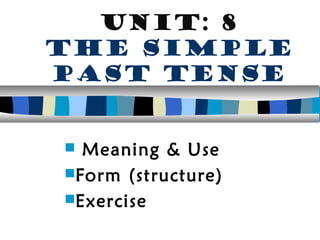Simple+past
•Descargar como PPT, PDF•
0 recomendaciones•85 vistas
simple past
Denunciar
Compartir
Denunciar
Compartir

Recomendados
Más contenido relacionado
La actualidad más candente
La actualidad más candente (20)
Similar a Simple+past
Similar a Simple+past (20)
Último
This presentation was provided by William Mattingly of the Smithsonian Institution, during the third segment of the NISO training series "AI & Prompt Design." Session Three: Beginning Conversations, was held on April 18, 2024.Mattingly "AI & Prompt Design: The Basics of Prompt Design"

Mattingly "AI & Prompt Design: The Basics of Prompt Design"National Information Standards Organization (NISO)
APM Welcome
Tuesday 30 April 2024
APM North West Network Conference, Synergies Across Sectors
Presented by:
Professor Adam Boddison OBE, Chief Executive Officer, APM
Conference overview:
https://www.apm.org.uk/community/apm-north-west-branch-conference/
Content description:
APM welcome from CEO
The main conference objective was to promote the Project Management profession with interaction between project practitioners, APM Corporate members, current project management students, academia and all who have an interest in projects.APM Welcome, APM North West Network Conference, Synergies Across Sectors

APM Welcome, APM North West Network Conference, Synergies Across SectorsAssociation for Project Management
Último (20)
Kisan Call Centre - To harness potential of ICT in Agriculture by answer farm...

Kisan Call Centre - To harness potential of ICT in Agriculture by answer farm...
Mattingly "AI & Prompt Design: The Basics of Prompt Design"

Mattingly "AI & Prompt Design: The Basics of Prompt Design"
BAG TECHNIQUE Bag technique-a tool making use of public health bag through wh...

BAG TECHNIQUE Bag technique-a tool making use of public health bag through wh...
Measures of Central Tendency: Mean, Median and Mode

Measures of Central Tendency: Mean, Median and Mode
APM Welcome, APM North West Network Conference, Synergies Across Sectors

APM Welcome, APM North West Network Conference, Synergies Across Sectors
Web & Social Media Analytics Previous Year Question Paper.pdf

Web & Social Media Analytics Previous Year Question Paper.pdf
Simple+past
- 1. Unit: 8 The simple past tense Meaning & Use Form (structure) Exercise
- 2. Meaning & Use When do we use the Simple Past tense? We use the Simple Past to express the idea that an action started and finished at a specific time in the past. What are some common time expressions used with the past tense?
- 3. Examples: I saw Maria yesterdayyesterday. Last FridayLast Friday, the students took their spelling and vocabulary tests. They got married two years agotwo years ago.
- 4. How do we form the simple past tense . . .? English has two typestwo types of verbs in the past tense: taught walked studied gave became cried lived did Look at the following list of past tense verbs… which verbs are regular, and which are irregular? Regular verbs Irregular verbs
- 5. RegularRegular verbs are verbs that …. Simple Form Past Tense Walk Study Cry Live …end with – eded
- 6. IrregularIrregular verbs are verbs that . . . . …DON’T end with –eded some irregular verbs Have a vowel change in the past tense: Simple Form Past Tense become became give gave drive drove forget forgot
- 7. other irregular verbs Have a different kind of change: SimpleSimple PastPast teach taughttaught bring broughtbrought Leave leftleft Hear heardheard Buy boughtbought
- 8. And some irregular verbs don’t change at all . . . SimpleSimple PastPast hit hit put put set set The children set the table every Sunday. The children set the table last night.
- 9. For regularregular verbs, simply use the –ed–ed form of the verb in a positive sentence. When I was a child, I ___________ the piano. (play) Donna ______________ Paris. (visit)
- 10. For irregularirregular verbs, use the correct past tense form in positive sentences. (We use the same form with different subjects .) Last week, I ___________ you a letter. (send) The students __________an English exam. (have) They _______ a great job! (do)
- 11. For negative sentences, USEFor negative sentences, USE I went to work yesterday. I didn’t godidn’t go to work yesterday.
- 12. Exception = VERB BE! The verb be is special. Never use DID NOT or DIDN’T with the verb BE. Instead, just use:
- 13. For Yes/No questions, USEFor Yes/No questions, USE Did you go to work yesterday? Did you come yesterday?
- 14. Put the verbs (between brackets)(between brackets) into the correct form (simple past).(simple past). Last year, I (spend) ________my holiday in Ireland. It (be) ________great. I (travel)___________ around the city by car with two friends and we (visit) ________lots of interesting places. In the evenings, we usually (go)_______ to a café. We (be) ________very lucky with the weather. It (not / rain)___________ a lot. We(see) ________some beautiful rainbows.
- 15. Student Practice: Go to this website with a classmate to practice what you have learned or reviewed today: http://www.quia.com/quiz/66441